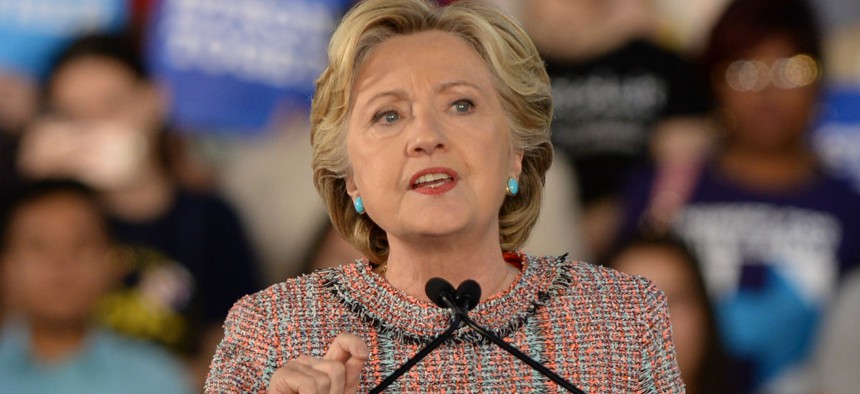
Democratic presidential nominee Hillary Clinton campaigns with former Vice President Al Gore in Florida. mpi04/MediaPunch/IPX
How Hillary Clinton Could End Washington's Gridlock
If she’s elected president and follows a more moderate path than Obama, it would strengthen her party and offer the GOP a lifeline.
For those only paying attention to the nasty presidential race, it’s easy to conclude the campaign won’t foreshadow an era of good feelings in Washington. But the conventional wisdom that presumes gridlock is the new normal is wrong. If Hillary Clinton wins the presidency and faces a closely divided Senate and GOP-controlled House—the most likely outcome—it would be in everyone’s political interest to cooperate and compromise in the president’s crucial first year.
Given her pragmatic instincts and productive working relationships with many top Senate Republicans, Clinton would have a rare opportunity to govern from the center following a general-election campaign in which she’s been reaching out to moderate Republicans. Unlike President Obama, who inherited a Senate supermajority in 2009 and faced a once-in-a-lifetime window to pass through a wave of liberal legislation, Clinton would need to build up her political capital and work with an opposition party that would be trying to pick up the pieces in the aftermath of Donald Trump.
Just consider: For the first time since 2008, an insurgent wave of primaries against moderate members of Congress never transpired. Clinton has warm relationships with many Senate Republicans, and has pledged to improve relationships with Congress on the campaign trail. To maintain power, Clinton would need to cater to the interests of her party’s most conservative members in Congress. Republicans and Democrats even demonstrated a rare bit of bipartisanship to pass a short-term spending bill covering funding for the Zika virus and the Flint water crisis, averting a government shutdown.
Here’s why a Clinton presidency could lead to an era of good feelings in Washington:
1. This year’s congressional primaries suggest the influence of the Republican Party’s uncompromising conservative wing is waning. It’s the paradox of this election: In the year when Trump engineered a hostile takeover of the GOP, establishment-minded Republicans cruised to victory in their own primaries. House Speaker Paul Ryan, who received a high-profile challenge from a Trump acolyte, won with a whopping 84 percent of the vote. Sen. John McCain of Arizona, whose approval with the base is low back home, still won by a 12-point margin against a tea-party-aligned opponent. Business-friendly groups spent money to defeat Rep. Tim Huelskamp of Kansas, a key leader in the House Freedom Caucus, helping elect a moderate who supported spending to help his district’s agricultural interests. The only congressional Republicans to lose primaries were ones challenged from the center or ones threatened by redistricting. Very few candidates tried to run on Trump’s coattails, even when he appeared to be in a competitive presidential campaign.
For all the talk that Trump could lead the party into ruin, it’s more likely that he co-opted the disruptive energy of the tea-party movement and will later leave it for dead. He’s winning over the same voters who railed against President Obama’s government spending even though he opposes reforming entitlements. The party’s conservative factions will have a hard time calling for pure principle after embracing a nominee who is as RINO as they come. Meanwhile, the conservative movement’s icon, Ted Cruz, is now a wounded politician without a natural home, hated by the establishment and mistrusted by many of his old fans for waiting so long to endorse Trump. He was pressured to do so out of fear he could face his own primary from a more-moderate challenger, Rep. Michael McCaul.
So if Clinton wins, she’ll find a chastened, more pragmatic opposition with a bit less fear of its right flank than before. If she makes a serious attempt to win back some blue-collar whites with an agenda designed to promote their economic interests (funding a wave of technical schools, as an example), she could find some willing partners across the aisle desperately looking for a way to engage Trump’s constituency without catering to its bigotry.
2. If Clinton wants to hold the Senate in 2018, she’ll need to focus on the interests of red-state Democrats. For all the talk that Clinton will be held hostage to the Democrats’ left-wing, Elizabeth Warren-led faction, the political reality is that she’ll lose the Senate if she veers too far to the left and doesn’t promote an agenda acceptable to red-state voters in Indiana, Missouri, Montana, and West Virginia. In 2018, Sens. Heidi Heitkamp, Claire McCaskill, Jon Tester, Joe Manchin, and Joe Donnelly will be up for reelection in states that Trump will likely carry by comfortable margins. All will face very challenging reelections, and will need a politically healthy Clinton to have a chance at winning.
Unlike Obama, who moved the country leftward at the expense of his allies in Congress, Clinton’s record suggests she will be more eager to build relationships in Congress and rebuild the bench of the Democratic Party. That starts with the 2018 midterm elections.
3. Control of the Senate could hang in the balance in Clinton’s first year. If Clinton wins the presidency and the Senate is divided 50-50—a very possible outcome—Republicans would have an early chance to deliver a blow to Democrats thanks to a special election for Tim Kaine’s Senate seat. In all likelihood, the race would be held in November 2017, giving Clinton an early battleground-state referendum of her first year in office. In an evenly divided Senate, the race would be awfully consequential and receive national attention.
Virginia has a long track record (with one notable exception, in 2013) of voting for the out party in its statewide elections held the year after the presidential race. To reverse this tendency, Clinton will need to show she’s capable of ending the gridlock that has defined Washington. And as Mark Warner, Tim Kaine, and Terry McAuliffe can attest, playing to Bernie Sanders’s left-wing base isn’t the ticket to winning the affluent swing voters in exurban Washington who are crucial to carrying the Old Dominion.
4. Incoming Senate Democratic Leader Chuck Schumer is a (liberal) pragmatist, while outgoing Leader Harry Reid is a bomb-thrower. Schumer is no pushover, but he understands that Democrats won’t hold control of the Senate if they rely only on the fickle Obama coalition of nonwhites and millennials. (In midterms, that formula has been a disaster.) As head of the Democratic Senatorial Campaign Committee in 2006, Schumer specifically recruited Democrats in red states who didn’t all hold the same views as the national party. He publicly broke with the Obama White House on the Iran nuclear deal, earning the administration’s wrath. He led support for the 9/11 lawsuit bill, putting its political popularity ahead of serious objections from the diplomatic community and the White House. (Reid was the lone Senate vote in favor of upholding Obama’s veto.)
Reid, by contrast, has loyally done the administration’s bidding even when it cost him his gavel as majority leader after the 2014 midterms. His steady stream of personal insults against Republicans has played a role in the poisonous relationship between the two parties in the upper chamber. He fashions himself as a savvy tactician, but his vaunted political machine is struggling to put away Trump and GOP Senate candidate Joe Heck in his home state.
5. Obama is an ideologue, while Clinton cares more about the political bottom line. In the past when I’ve written that Obama’s ideological blinders and resistance to compromise have played a key role in Washington gridlock, it reliably generates heated blowback from the president’s supporters.
A Clinton presidency would offer an important test of the thesis: Which side is more responsible for the gridlock? Many political incentives would be in place for cooperation. Clinton wouldn’t be in strong political position to offer a laundry list of liberal policies in her first year. Republicans badly need to show that they’re capable of governing. If Republicans refuse to compromise no matter the circumstances, it would prove that they’re beyond saving. But don’t be surprised if we enter a surprising new era of cooperation with new leaders in charge come 2017.
NEXT STORY: Play of the Day: Trump is Now Unshackled







